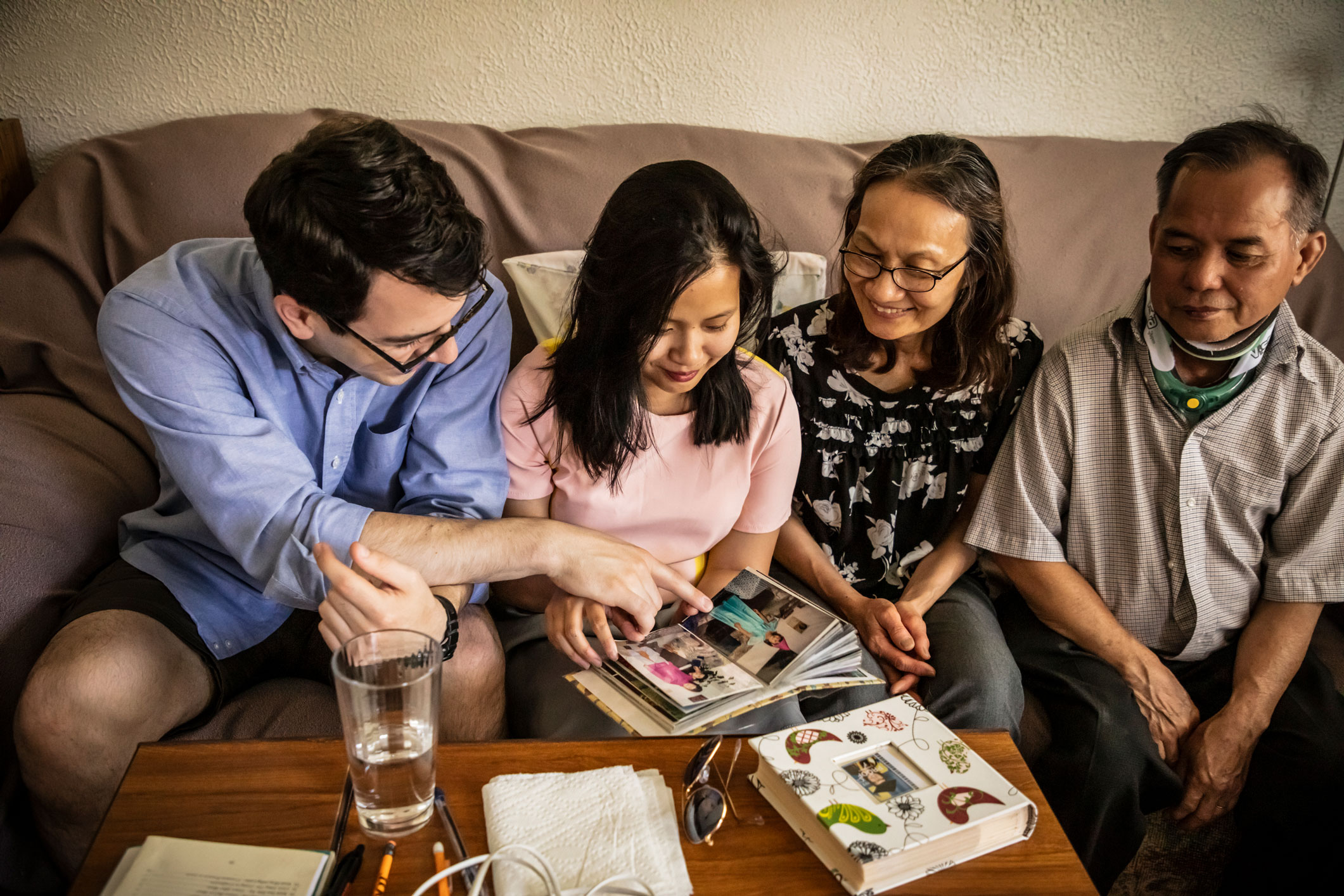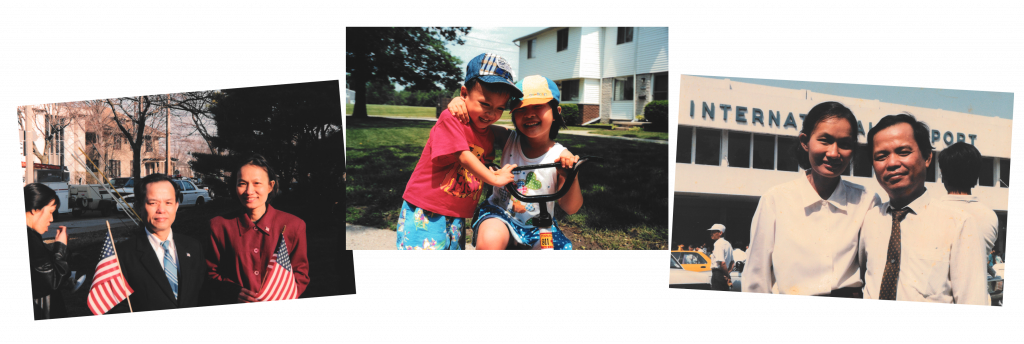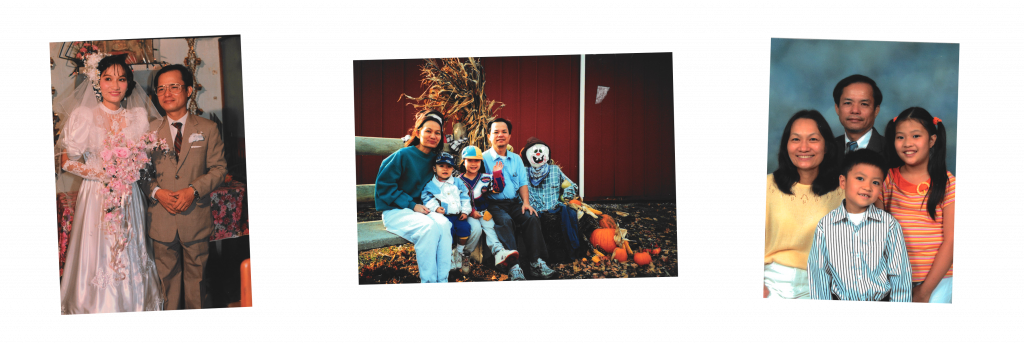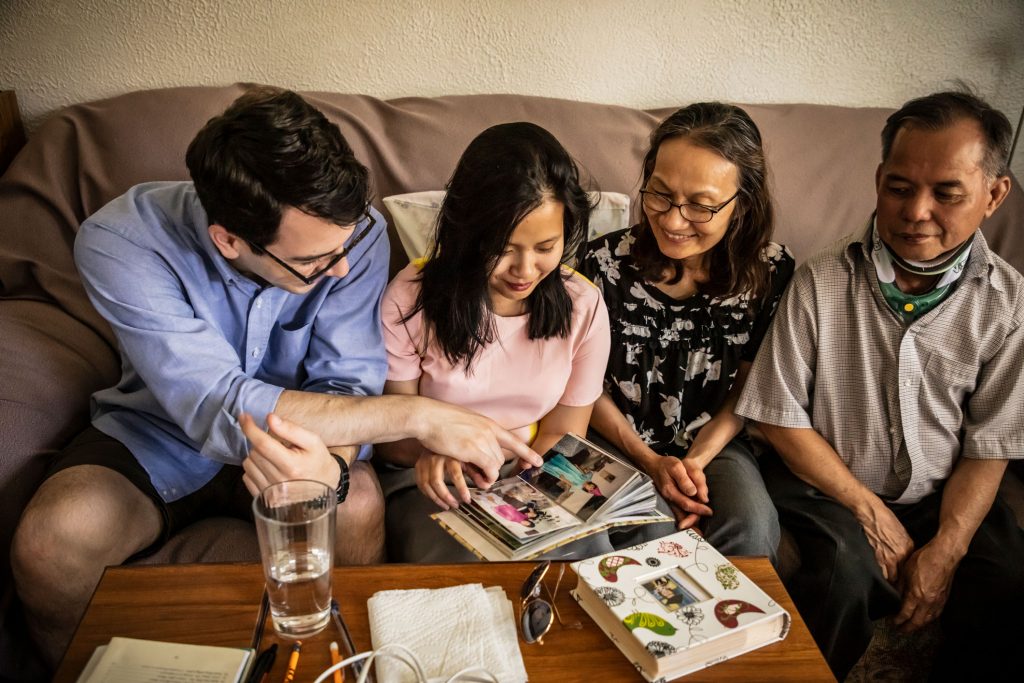
“I want to help others get a little bit closer to their own dreams.”
Huong Haley, the daughter of a Vietnamese prisoner of war, speaks up about how her background—which she identifies as “first generation, low income”—surfaced challenges during her transition to corporate life. Now, she’s making it easier for others to find their way, too.
Huong Haley is always on the hunt for a deal—marked-down clothes, free food, cheap airfare home to Lansing, Michigan. For Huong (whose name is loosely pronounced as Hoon in English), stretching every dollar to its maximum capacity is a moral imperative.
When Huong was getting ready to go on her first business trip as a Microsoft employee, she did what she always did when booking travel: she found the cheapest deal possible—even though this time, the company would be paying the bill.
When her fellow coworker and travel partner, Lori Knapp, visited Huong at the motel, Lori noticed a few problems: stained walls, dingy-looking beds, one communal hallway bathroom, and a location pretty far from the conference center.
Lori persuaded her friend to upgrade her hotel to a more convenient location, assuring her that Microsoft wanted their experience to be safe and comfortable.
“As a new employee, you know you should be frugal when booking work trips,” Lori—who has since moved on from the company—explains. “But for most, ‘frugal’ is a subjective term; it’s not for Huong.”
That incident kicked off a conversation between the two about Huong’s background. Huong’s motel choice was but one example where she, and other people who identify as first generation, low income (or FLI or FGLI), had to decode the often-unspoken behaviors of corporate culture.
People who identify as FLI—a term and acronym made popular through higher education research and programs—might be the first in their families to attend college or might come from a low-income background or household. Once they are in the workplace, FLI employees might also be the first in their families to hold full-time corporate jobs that have high-paying salaries and some job security. They might also encounter unique challenges in the transition.
“If you’ve never had a salary before, how do you know if you are being offered a fair wage? What’s the norm?” Huong said, explaining the questions that many people who identify as FLI are forced to ask.
“What kind of health-care options do you need when you’ve never had to pick before? What the heck is a PPO or a 401k, and how do you make the most of them?”

Huong knows that these are points of confusion for many new employees no matter their background, but she says that there’s another layer of tension present for people identifying as FLI: their broader family or community may not be able to help guide them through these issues.
“We can’t ask our parents since they haven’t had to do any of this, so we have to rely on our own resourcefulness and the community we build around us.”
Huong came to rely on her FLI community at the University of Michigan during her undergraduate studies and missed that support when she started at Microsoft.
Huong laughs at the motel story now—and today, nearly four years after joining the company through the Microsoft ACE Rotation program, she’s adjusting well to the culture. Now, she’s given herself a new challenge: make that transition easier and faster for other FLI employees at Microsoft.
*****
Born and raised in Vietnam, Huong’s dad fought on the South Vietnamese side during the Vietnam War, during which he was captured and held as a prisoner of war by the Viet Cong. After the war, he was released and soon met Huong’s mom; they married, and they had Huong.
When Huong was one year old, they came to the United States through an immigration policy that granted citizenship to South Vietnamese veterans. They had donated their home in Saigon to a nun to start a women’s shelter, so they arrived in the United States with little money. They quickly found low-income housing in Lansing, Michigan, where Huong’s uncle had immigrated and began the work of acclimating to a new culture.

From the time Huong could read, write, and speak English, she began to translate for her parents. At age six, she was helping her dad read websites for job offerings. Later, after a layoff, she applied for government assistance and health care on his behalf.
“It wasn’t just filling out applications,” Huong emphasizes. “It was also searching for what websites to go to for unemployment. I had to learn how to find things—literally typing in the words ‘Michigan unemployment’ into the search bar.
“Taking on those type of applications and challenges at a really young age and kind of being the head of the household for your family, I think that’s pretty unique to immigrant families and families coming from lower income backgrounds who need resources,” she says.
“I had to grow up faster than many of my peers.”
*****
Although one of Huong’s goals (and her parents’ dreams for her) is job and financial stability, Huong’s feelings about her current income as a Microsoft employee fills her with a confusing mix of celebration and sadness.
“My parents ran a smoothie stand near their home in Saigon for a few years. When they started, they didn’t know how to make smoothies; they just did it one day and kept doing it until they perfected the taste. My mom has amazing social skills—a smoothie saleswoman; my dad, an electrician in Vietnam, is super sharp,” she explains.”
“I had to grow up faster than many of my peers.”
She struggles to understand how her parents’ skills didn’t translate (while her skills did) to a professional career or higher paying job in the United States. But then Huong sees that they are so proud of her and her brother and reconsiders that maybe it’s okay that her parents are where they are.
“I still feel guilt sometimes, but instead of letting it get me down, I use it to fuel my dream even more. With all the support I have been given, I want to help others get a little bit closer to their own dreams.”
*****
For Huong and other employees identifying as FLI, the extra effort to understand certain corporate norms is more than inconvenient; the results can negatively affect a person’s mental well-being.
For example, if people don’t know that some job aspects are negotiable, they may not advocate for themselves, which could result in feeling stuck and eventually defeated. They might soon quit a job they worked so hard for, become turned off at the idea of working in future corporate environments, and maybe even get cut off from potentially higher sources of income.
“In many ways, you feel so lucky to be at Microsoft in the first place that it can be hard to talk to your manager about job advancement,” Lori adds.
“Coming from a place of gratitude is good, but that can also mean you don’t think to ask for more.”
 Additionally, FLI employees who don’t live close to their families can experience pressure from family members who don’t understand why their child or sibling moves away for a job, says Huong. Especially when they could live at home, save money, and remain an active member of the day-to-day family life.
Additionally, FLI employees who don’t live close to their families can experience pressure from family members who don’t understand why their child or sibling moves away for a job, says Huong. Especially when they could live at home, save money, and remain an active member of the day-to-day family life.
For instance, last year Huong’s father was injured in a car accident in Lansing. Huong managed his health care and insurance remotely from Seattle where she lives with her husband, Tom. She says it’s hard being far away from them, and she knows it’s hard on them—considering how much they rely on her—but Huong’s parents have never expressed anything but support and pride. Still, her parents are getting older and speak only Vietnamese, so Huong feels the pressure every day to take care of a lot. She’s hoping to convince her parents to move out to Seattle someday soon.
*****
When Huong had the idea to start an employee network called FLI (pronounced fly) to Microsoft, she reached out to Lori, who was passionate about the cause as well. During business school, Lori had started a nonprofit that aimed to simplify direct cash donations to people in poverty. Two other cofounders joined the cause, and the team launched the community in early 2018.
FLI to Microsoft, now with more than 200 members and 8 co-leaders, is working to balance the inequity of knowledge among employees: knowledge of corporate norms and lingo and knowledge of logistics, resources, people, and behaviors. It’s the gap between what some new employees should know for succeeding in a new job versus what they do know.
“It’s quite a big jump,” Huong says. “I want to make sure people know they’re not alone.”
FLI to Microsoft is currently focused on finding ways to volunteer their time and resources to the local community, spreading the news to new employees about joining FLI, and creating a digital hub for people to share resources. And it’s not just for new employees; it’s common for longer tenured employees to reach out to the group—some admitting to still being confused about aspects of corporate life, while others share links, tips, and insights that they picked up along the way.
“Coming from a place of gratitude is good, but that can also mean you don’t think to ask for more.”
“The answers people need are usually there, and we are working to make them super easy to find,” says Huong.
 In the end, Huong hopes that FLI to Microsoft will become a well-known group where people can come to feel accepted. She also hopes to become a group of trusted advisors—just as many other employee groups at Microsoft have—to help internal product teams consider the viewpoints of people coming from economic backgrounds like hers. Also, she’d like to help coworkers remember that there are many aspects of corporate culture that are not the norm for many people.
In the end, Huong hopes that FLI to Microsoft will become a well-known group where people can come to feel accepted. She also hopes to become a group of trusted advisors—just as many other employee groups at Microsoft have—to help internal product teams consider the viewpoints of people coming from economic backgrounds like hers. Also, she’d like to help coworkers remember that there are many aspects of corporate culture that are not the norm for many people.
And for herself? Huong says for her most of her life she was so focused on pulling her family out of poverty and accomplishing her goals that she put her mental wellness second—something the pandemic has given her the opportunity to consider. “There are many intersections between experiences and identities. FLI is just one of them.” She hopes to create spaces for FLI community members to share and to foster even more conversations about intersectionality.
For now, Huong is keeping it simple. “If I can help someone else breathe a little bit easier because I shared my story, it’s all worth it.”
*****
